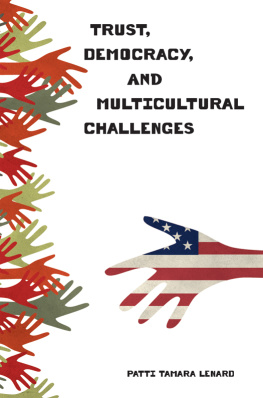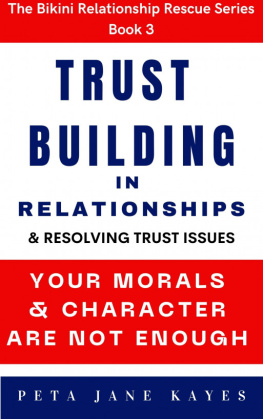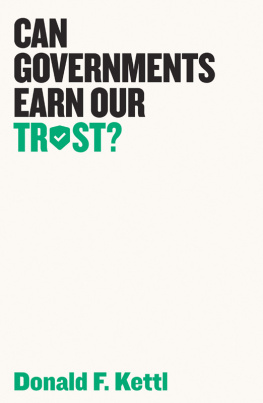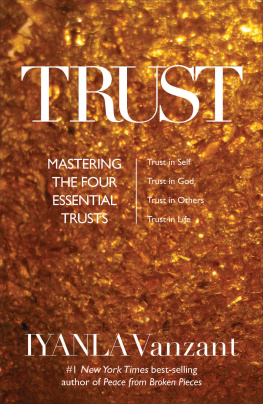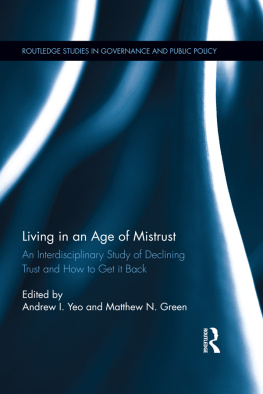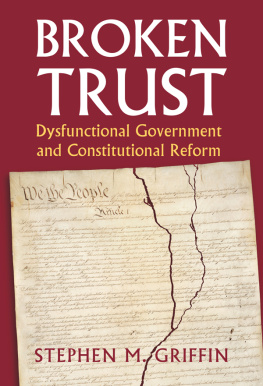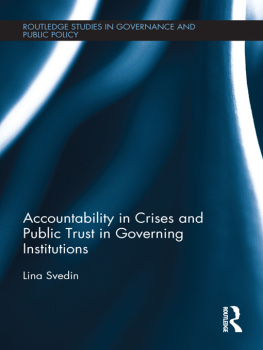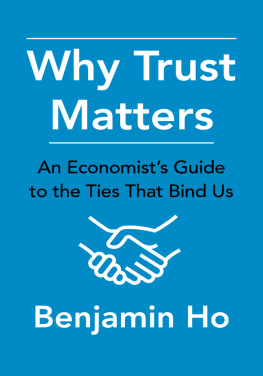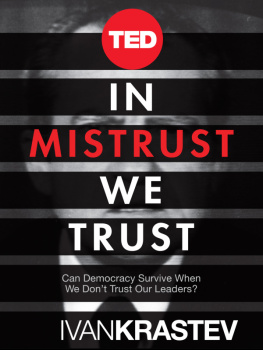Library of Congress
Cataloging-in-Publication Data
Lenard, Patti Tamara, 1975-
Trust, democracy, and multicultural challenges / Patti Tamara Lenard.
p. cm.
Includes bibliographical references and index.
Summary: Examines the potential for distrust in an environment of ethnocultural diversity arising from increasing rates of immigration, and its implications for a democratic society. Incorporates democratic theory, multiculturalism theory, and migration theoryProvided by publisher.
ISBN 978-0-271-05253-3 (cloth : alk. paper)
1. DemocracySocial aspects.
2. Multiculturalism.
I. Title. JC423.L464 2012
306.2dc23 2011034411
Copyright 2012
The Pennsylvania State University
All rights reserved
Printed in the United States of America
Published by
The Pennsylvania State University Press,
University Park, PA 16802-1003
The Pennsylvania State University Press
is a member of the
Association of American University Presses.
It is the policy of The Pennsylvania State University Press to use acid-free paper. Publications on uncoated stock satisfy the minimum requirements of American National Standard for Information SciencesPermanence of Paper for Printed Library Material, ANSI Z39.481992.
This book is printed on Natures Natural, which contains 50% post-consumer waste.
This book has its origins in two distinct incidents. One is a lecture I attended given by Dr. Charles Pentland at Queens University on the structure of the United Nations trusteeship in Kosovo. His lecture prompted me to consider the phenomenon of trust and the institutional structures that can support trusting relations among citizens. Another is a conversation I had long ago with Angela Kaida in which we both learned that we shared a key experience as children of immigrants: a moment in which an adolescent friend pointed out something we had never before noticed, that our parents have weird accents in English. My intellectual preoccupations with both trust and the immigrant experience have, after many years, culminated in the arguments I make in this book.
The road from these incidents to this book is of course long, and I owe thanks to many people for friendship and intellectual stimulation of all kinds.
Although this book is a distant relative of the DPhil that preceded it, the original ideas were crafted under the careful supervision of David Miller at Nuffield College, Oxford University. Several of the individual chapters were sharpened (and one abandoned!) as a result of discussions with my thoughtful and engaged external readers, Anne Phillips and Mark Philp. Avigail Eisenberg and Mathew Festenstein attentively reviewed the original manuscript for Penn State Press and offered invaluable comments, for which I and the final manuscript are deeply appreciative.
Zofia Stemplowska and Jacob J. Krich read the near-final version of the manuscript and offered careful and incisive suggestions that improved the book immensely. Jacob is married to me, and so may have been contractually obligated to carry out this task (I cant say for sure because our marriage contract is in a language I do not speak or read), but no such contract obligated Zofia. I am beyond lucky to have benefited from her careful criticism (all trenchant), her thoughtful suggestions (all but one taken), and her friendship (valued immensely).
Avia Pasternak and Terry Macdonald, close friends with whom many of the ideas in this book have been discussed at great length and with extraordinary generosity of spirit, both stepped in at crisis moments. Avia read and immeasurably improved a chapter with her comments. Many of the ideas that form the foundation of the book were formulated over discussions with Terry in the years we were students, and flatmates, at Nuffield College. She also read the entire manuscript and offered encouragement at the precise moment that I needed someone to tell me to press on.
Others have read or commented on individual chapters, and I hope the final product shows that I have listened to them carefully: Clare Chambers, Nicholas Cheeseman, Joshua Cherniss, Elizabeth Fraser, Michael Freeden, Andrew Hurrell, Jonathan Quong, Tiziana Torresi, and Mark Warren. I have presented my work at many conferences, too many to list here, but it is essential that I thank the participants of the Nuffield Political Theory Workshop conducted between 2001 and 2004, nearly all of whom engaged critically and seriously with my work.
Discussions with several scholars have been instrumental in shaping how I think about trust: Barbara Arneil, who generously shared parts of an unpublished manuscript with me, as well as Keith Banting, Chris Bertram, Avigail Eisenberg, Richard Johnston, Will Kymlicka, Finn Spicer, and Natalia Letki. I owe special thanks to Stuart Soroka, with whom I co-organized a workshop at Nuffield titled Conceptualizing Trust: Interdisciplinary Perspectives. Stuart was instrumental in persuading me that a solely philosophical approach to the concept and phenomenon of trust would be inadequate, and his pressure to consider the concept more broadly is reflected in the first chapter in particular.
I prepared the initial manuscript over four wonderful years I spent as a lecturer in the Committee on Degrees in Social Studies at Harvard University, and I wish to thank several of my colleagues there for creating a collegial and supportive environment in which to work: Kate Anable, Anya Bernstein, Bo-Mi Choi, Noah Dauber, Michael Frazer, Glyn Morgan, Nicole Newendorp, Stefan-Bird Pollan, Thomas Ponniah, Verity Smith, and Scott Staring. I owe a special thanks to David Meskill, who guided me through the process of preparing and submitting a book proposal.
I completed the manuscript as a member of the Graduate School of Public and International Affairs at the University of Ottawa, and I wish to say publicly that it is a pleasure to be part of such a collegial and dynamic group of scholars and students. I owe a special thanks to my close friend and collaborator, Christine Straehle, whose good food, good cheer, and good ideas have propelled this manuscript (and several others) to completion.
The staff at Penn State Press are truly exceptional, and it is has been a pleasure to work with them. I would like especially to thank Sandy Thatcher, who first expressed interest in the manuscript, for his encouragement throughout the review process (and for many discussions of the lot of the master swimmer), and Kendra Boileau for supporting the manuscript through to its publication.
Id like to thank several people personally as well. Margaret Moore, my first-ever professor of political theory, the supervisor of my undergraduate thesis, and now my friend and collaborator, has (among many other things) generously taken on the job of guiding me through the vagaries of professional academic life, for which I am ongoingly grateful. Angela Kaida, my closest friend since my first day of university, has confidence in me that I dont deserve, a confidence that is rivaled by the confidence I have in her, which in her case is richly deserved. My parents, John and Harriet Lenard, have offered unwavering encouragement to all of my intellectual decisions. Their pride in and love for me has been a source of support on which I have constantly relied and have always appreciated as one of my greatest resources.

